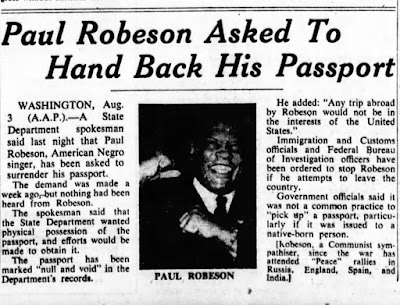Paul Robeson was quite possibly the most identifiable African American in the world in 195o. His incredible baritone voice was heard on records, stage, and screen, he was known for his posture in civil rights for American Blacks and equality and for his anti-Imperialist politics, which were seen by many as being pro-communist and anti-American
Robeson gained fame in 1925 when he got his first staring role in Eugene O’Neill’s “All God’s Chillun Got Wings” and then the lead in the play “Emperor Jones” his success in theater led him to be part of the Harlem Renescanice with a social circle of Langston Hughes and W.E.B. Dubois.
Robeson went to London in the late 1920s to perform “Emperor Jones” and he began to see the world through very different eyes. He played Joe in the London production of “Showboat” and his version of “Old Man River” became the international standard. His travels led him to meet a new class of intellectuals and stimulated in him a desire to learn more about Africa and his heritage. He also became a film star and became more vocal about the roles he would not take if they were anti-Negro or supported the colonial view of history in Africa.
He met and formed a close friendship with Einstien over music when the professor came backstage at one of his concerts in 1935
Robeson became increasingly an activist by standing with the Spanish loyalist and Republicans during the Spanish Civil War and then with Jewish refugees during World War II although he had issues with the segregated military of the United States he supported the war effort.
After the war his controversial anti-imperialist stances caught the ear and eye of the attorney general’s office and after a failed meeting with President Truman regarding anti-lynching legislation. Robeson Robeson founded the American Crusade Against Lynching organization in 1946, the organization was then put on the list of “Subversive” organizations by the House UnAmerican Activities Committee. Robeson was also very vocal in supporting labor unions and the Civil Rights Congress. He was called to testify before HUAC because of his friendship with known American Communists. In 1949 his concert in Peekskill, New York led to riots and had to be rescheduled because he had become such an outspoken activist for civil rights, peace, and against the HUAC, he was also seen as a sympathizer with the U.S.S.R.
It was against this backdrop and history that the United States Department of State rescinded his passport on Aug. 4th, 1950. This led to an eight-year struggle between Robeson and the Federal Government. Unable to travel Robeson saw much of his income cut and in the U.S. he struggled to find work because of the perception that he was a communist sympathizer, this idea was reinforced when he came out against the Korean action by the U.S. He was very much opposed to the war and spoke out against it in “Hands Off Korea” rallies, he also was very outspoken about the inequality in the U.S. while the nation was intervening in Korea for ‘Freedom’. Robeson and his with were very aware of the times and how, in their view, the United States was acting as an imperialist power in Korea but also puppet regimes in Iran and the activities in Africa especially in Egypt during the 1950s. His career suffered greatly and he was all but black-listed from TV and radio for his views. Without the passport, he couldn't travel to more friendly European countries to perform and thus his income was greatly reduced. Despite this Robeson persevered.
He began a monthly magazine with DuBoise named “Freedom” and he wrote the lead editorial on the front page for five years. He presented the United Nations with a petition claiming genocide by the United States over slavery, Jim Crow, and lynching. He performed at peace concerts at the Peace Arch by the Canadian Border in Washington State.
In 1956, Robeson was called before HUAC again. In his testimony, he invoked the Fifth Amendment and refused to reveal his political affiliations. However, he did state, “My father was a slave and my people died to build the United States and, I am going to stay here, and have a part of it just like you and no fascist-minded people will drive me from it!”
Given the Cold War politics and the segregation of America, it is no surprise that Robeson faced the problems he did. Yet none of this deterred him, his ethos, as he stated before HUAC in 1956, “Whether I am or not a Communist is irrelevant. The question is whether American citizens, regardless of their political beliefs or sympathies, may enjoy their constitutional rights.”
Robeson’s passport was returned to him after the 1958 Supreme Court decision in Kent v Dulles ruled that no one could be denied their passport without due process.
Sources:
https://www.biography.com/actors/paul-robeson


No comments:
Post a Comment